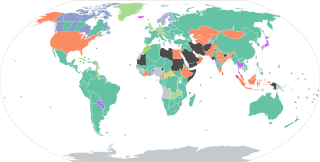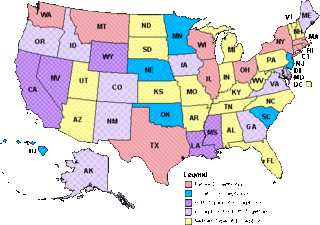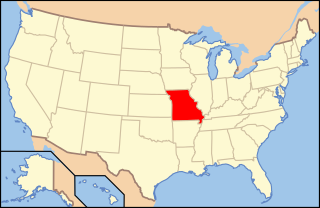In law, a minor is someone under a certain age, usually the age of majority, which demarcates an underage individual from legal adulthood. The age of majority depends upon jurisdiction and application, but it is commonly 18. Minor may also be used in contexts that are unconnected to the overall age of majority. For example, the smoking and drinking age in the United States is 21, and younger people below this age are sometimes called minors in the context of tobacco and alcohol law, even if they are at least 18. The terms underage or minor often refer to those under the age of majority, but may also refer to a person under other legal age limits, such as the age of consent, marriageable age, driving age, voting age, working age, etc. Such age limits are often different from the age of majority.

The legal drinking age is the minimum age at which a person can legally consume alcoholic beverages. The minimum age alcohol can be legally consumed can be different from the age when it can be purchased in some countries. These laws vary between countries and many laws have exemptions or special circumstances. Most laws apply only to drinking alcohol in public places with alcohol consumption in the home being mostly unregulated. Some countries also have different age limits for different types of alcohol drinks.
Public intoxication, also known as "drunk and disorderly" and "drunk in public", is a summary offense in some countries rated to public cases or displays of drunkenness. Public intoxication laws vary widely by jurisdiction, but usually require an obvious display of intoxicated incompetence or behavior which disrupts public order before the charge is levied.

Although the minimum legal age to purchase alcohol is 21 in all U.S. states and most territories, the legal details for consumption vary greatly. Although some states completely ban alcohol usage for people under 18, the majority have exceptions that permit consumption.

The German laws regulating alcohol use and sale are mostly focused on youth protection. In contrast to many other countries, legislation is relatively lenient and not designed to keep young people away from alcohol, but rather intended to teach them an appropriate approach to alcohol consumption, which is reflected by one of the lowest drinking ages in the world.

Oklahoma allows any establishment with a beer and wine license to sell beer and wine up to 15% ABV, under refrigeration.

The alcohol laws of Missouri are among the most permissive in the United States. Missouri is known throughout the Midwest for its largely laissez-faire approach to alcohol regulation, in sharp contrast to the very strict alcohol laws of some of its neighbors, like Kansas and Oklahoma.

Alcohol laws of New York are a set of laws specific to manufacturing, purchasing, serving, selling, and consuming alcohol in the state of New York. Combined with federal and local laws, as well as vendor policies, alcohol laws of New York determine the state's legal drinking age, the driving under the influence limit, liquor license requirements, server training, and more.

The alcohol laws of Pennsylvania contain many peculiarities not found in other states, and are considered some of the strictest regulations in the United States.

The alcohol laws of the United States regarding minimum age for purchase have changed over time. In colonial America, generally speaking, there were no purchase ages, and alcohol consumption by young teenagers was common, even in taverns. In post-Revolutionary America, such freedom gradually reduced due to religious sentiments and a growing recognition in the medical community about the dangers of alcohol. The more modern history is given in the table below. Unless otherwise noted, if different alcohol categories have different minimum purchase ages, the age listed below is set at the lowest age given. In addition, the purchase age is not necessarily the same as the minimum age for consumption of alcoholic beverages, although they have often been the same.
Alcohol laws of Maryland vary considerably by county, due to the wide latitude of home rule granted to Maryland counties.

The state laws governing alcoholic beverages in New Jersey are among the most complex in the United States, with many peculiarities not found in other states' laws. They provide for 29 distinct liquor licenses granted to manufacturers, wholesalers, retailers, and for the public warehousing and transport of alcoholic drinks. General authority for the statutory and regulatory control of alcoholic drinks rests with the state government, particularly the Division of Alcoholic Beverage Control overseen by the state's Attorney General.
Alcohol laws of Australia are laws that regulate the sale and consumption of alcoholic beverages. The legal drinking age is 18 throughout Australia. The minimum age for the purchase of alcoholic products in Australia is 18. A licence is required to produce or sell alcohol.

Alcohol laws are laws relating to manufacture, use, being under the influence of and sale of alcohol or alcoholic beverages. Common alcoholic beverages include beer, wine, (hard) cider, and distilled spirits. Definition of alcoholic beverage varies internationally, e.g., the United States defines an alcoholic beverage as "any beverage in liquid form which contains not less than one-half of one percent of alcohol by volume". Alcohol laws can restrict those who can produce alcohol, those who can buy it, when one can buy it, labelling and advertising, the types of alcoholic beverage that can be sold, where one can consume it, what activities are prohibited while intoxicated, and where one can buy it. In some cases, laws have even prohibited the use and sale of alcohol entirely.
The alcohol laws of Wisconsin consist of both statewide statutes and local ordinances governing the sale of alcohol.

Social customs and laws concerning drinking alcohol in public vary significantly around the world. "Public" in this context refers to outdoor spaces such as roads, walkways, parks, or in a moving vehicle. Drinking in bars, restaurants, stadiums, and other such establishments, for example, is not generally considered to be "in public" even though those establishments are open to the general public.

The serving of alcohol in the Commonwealth of Massachusetts is governed by the Alcoholic Beverages Control Commission (ABCC), which is responsible for issuing licenses and permits for all manufacturers, wholesalers and importers, out-of-state suppliers, brokers, salespeople, warehouses, planes, trains, ships, ship chandlers and vehicles transporting alcoholic beverages.
The alcohol laws of Maine regulate the sale and possession of alcohol in the state of Maine in the United States. Maine is an alcoholic beverage control state.
Missouri has two forms of expungement, one generally applicable to criminal cases and a unique one for the crime of being a minor in possession of alcohol. On July 13, 2016, governor Jay Nixon signed Senate Bill 588 into law, which expands the opportunities available for expungement of criminal convictions in Missouri. The new law went into effect January 1, 2018.











